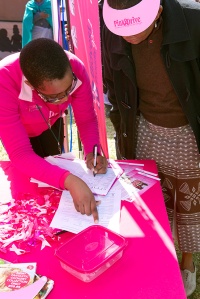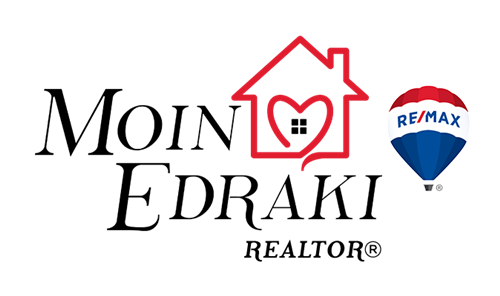Rotary health days across Africa in May
Note: Marion Bunch was a speaker at the D5020 conference in Victoria, June 2012.
For three days in May, Rotarians from 365 clubs fanned out across Uganda, Nigeria, and South Africa to help medical professionals and government workers provide free health services to 250,000 disadvantaged people.
Rotary Family Health Days, the third event organized by Rotarians for Family Health and AIDS Prevention (RFHA), was an incredible success! The program, initially developed to address the critical issue of HIV/AIDS in Africa, has always included other health care services. This year, we conducted polio and measles immunizations, dental and eye clinics, family counseling and screening for HIV, diabetes and hypertension, breast cancer, and cervical cancer.
Why I got involved

Volunteers provide counseling and share information about breast cancer at a booth in Zandspruit, South Africa. Photo by Anna J Nel
In 1994, I lost my second born child, Jerry, to AIDS early in the American epidemic. At that time, the disease was so stigmatizing, I felt quite lonely not being able to discuss Jerry’s illness with anyone outside my family. I never thought I’d do anything about it until one day, three years after his death, I felt a tap on the shoulder and a voice in my ear said “mom, get up and get going, you haven’t done anything, and it’s been three years.”
It was an epiphany of a moment that completely altered the course of my life.
In 1998, I was propelled into taking the first step to begin a project in my Rotary club. The fact that our club president said ‘yes’ to my idea made me a passionate Rotarian for life! From the start, I realized that finding partner organizations in the field of HIV/AIDS would be important because Rotarians are not AIDS experts. I created a partnership program with a local AIDS service organization whereby together, we provided AIDS education in the middle schools of Georgia. This sobering program has now been seen by 450,000 students!
My interest ultimately took me to Africa in 2001, where I quickly realized the huge disparities between America and the developing world. I was struck by the hugeness and the filth of the slums in places like Nairobi, Kenya. I realized that there are 20 million orphans living there now because their parents died of the consequences of AIDS. They have little to eat, they are often shunned by their community, and they drop out of school because they don’t have the funds to pay the schools fees or get uniforms.
I was also amazed at the reception given me in African countries by fellow Rotarians who were so glad to welcome an American Rotarian woman who was interested in working on this issue. The year was 2001. I ultimately began a Rotarian Action Group recognized by the RI Board of Directors in 2004. It was so rewarding to meet thousands of Rotarians out in the world that had an interest in doing something about this disease!
Incredible journey
Today, I look back and realize what an incredible journey I have been on since then. I gained ideas from public health experts, and I met people that I’m sure God put in my path because I didn’t have the knowledge or good sense to even know that I should be meeting them. I have gained mentors in many parts of the world on this issue. I got to thinking that the ‘partnership’ concept was the right way to approach helping the children and their families. We can’t do things alone but must work together to really get something done.
Rotary Family Health Days has demonstrated this principle in action. Since 2011, RFHA has partnered with the Coca-Cola Africa Foundation, which contributed US$450,000 for this year’s event. Other partners have included South Africa’s Department of Health, South Africa Broadcasting Corporation, U.S. Centers for Disease Control and Prevention, USAID, Delta Airlines, and Nampak (a producer of sanitary pads).
Through the power of public/private partnerships, each partner has a defined role and set of responsibilities, and that’s why it works. Rotary serves as the catalyst organization because of the power and (political) neutrality of our brand and the respect we receive worldwide for our ability to mobilize communities into action.
I’m certainly not a genius and have faced many challenges along the way. But I have never lost my passion because I remember all the challenges that my son realized when he was alive. That drives me as it would most moms. But most importantly, I have been able to achieve this work because of the power of Rotary’s brand and the respect it receives everywhere. I am so proud to be a part of this organization!!
- Learn more about how Rotarians For Family Health and AIDS prevention brings Rotary members together to promote health and prevent disease
- Read a blog post from senior media relations specialist Stéphanie Tobler Mucznik about this year’s health days event
- Learn more about how Rotarian Action Groups allow you to share your expertise and make a difference in projects beyond your club or district.
Download the website sponsorship guide


